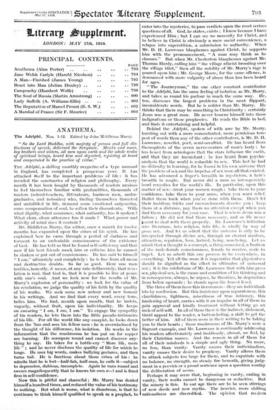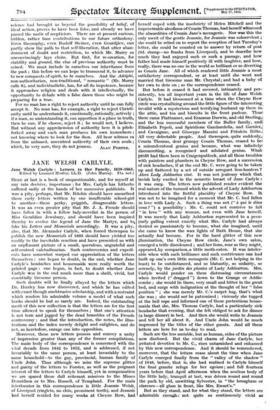ANATHEMA.
The Adelphi. Nos. 1-12. Edited by John Middleton Murry.
" So the Lord Buddha, with majesty of person and full dis- tinctness of speech, delivered the Scripture. Monks and nuns, lay brothers and sisters, all men upon earth and the whole realm of spiritual beings, heard him and departed, rejoicing at heart and consecrated to the practice of virtue."
THE Adelphi, a shilling monthly magazine of a type unusual in England, has completed a prosperous year. It has attached itself to the important problems of life : it has invaded the sanctuaries of religion and philosophy. Every month it has been bought by thousands of readers anxious to feel themselves familiar with profundities, thousands of readers (school-teachers, litterateurs, business men, under- graduates, and nobodies) who, finding themselves thwarted and unfulfilled in life, demand some emotional outpouring, some compensation of soul, to soften their discontents. With what dignity, what assurance, what authority, has it spoken ? What clear, clean utterance has it made ? What power and activity of mind does it contain ?
Mr. Middleton Murry, the editor, once a month for twelve months has expanded upon the crises of his spirit. He has explained how he came through a period of darkness and torment to an undeniable consciousness of the existence of God. He has told us that he found self-sufficiency and that now if his best friends mock him or criticize him he cannot be shaken or put out of countenance. He has said to himself " I am," ultimately and completely : he is free from all mean and destructive doubts. So far so good. Here one man testifies, honestly, it seems, at any rate deliberately, that reve- lation is real, that God is, that it is possible to live at peace with one's soul. And we look now for the results of Mr. Murry's explosion of personality : we look for the value of his revelation, we judge the quality of his faith by the quality of his works. We seek some new ardour and new honour in his writings. And we find that every word, every tone, belies him. We find, month upon month, that he insists, vaguely, without fruit, upon his individuality. He keeps on swearing " I am, I am, I am." To engage the sympathy of his readers, he lets them into the little pseudo-intimacies of his life. For all the world like any essayist, he looks down from the 'bus and sees his fellow men : he is overwhelmed by the thought of his difference, his isolation. He works in the information that the mushrooms he has put on for supper are burning. He scampers round and cannot discover any- thing to say. He takes for a battle-cry " More life, more life " ; and he never discloses the quality of life for which he longs. He uses big words, makes bullying gestures, and then turns tail. He is facetious about those crises of his : he admits that he is lost half-fish, half-man, he calls it—subject to depression, dubious, incomplete. Again he runs round and swears magniloquently that he knows his own soul and is fixed firm in self-confidence.
Now this is pitiful and shameful ; Mr. Murry has denied himself a hundred times, and reduced the value of his testimony to nothing. But what is worse, what is disastrous, is that-he continues to think himself qualified to speak as a prophet, to
enter into the mysteries, to pass verdicts upon the most serious questions of all. God, he states, exists ; I know because I have experienced Him ; but I can see no necessity for Christ, and to believe in Christ is obviously a mere social convenience, a relapse into superstition, a submission to authority. When Mr. D. H. Lawrence blasphemes against Christ, he supports him with the pronouncement, " A man may think as he chooses." But when Mr. Chesterton blasphemes against Mr.
Thomas Hardy, calling him " the village atheist brooding over the village idiot," then all the nobility of Mr. Murry's rage is poured upon him ; Mr. George Moore, for the same offence, is denounced with more vulgarity of abuse than has been heard for ages.
" The Journeyman," the one other constant contributor to the Adelphi, has the same feeling of isolation as Mr. Murry, and takes us round his parlour in much the same way. He, too, discusses the largest problems • in the most flippant, inconsiderate words. But he is milder than Mr. Murry. He thinks that there may be something in Christianity : certainly Jesus was a great man. He never loosens himself into those indignations or those prophecies. He reads the Bible in bed, and finds it entertaining and helpful.
Behind the Adelphi, spoken of with awe by Mr. Murry, bursting out with a more concentrated, more pernicious tem- pest of words than any of the other contributors, is Mr. D. H.
Lawrence, novelist, poet, semi-occultist. He has heard from theosophists of the seven nerve-centres of man's body ; he has heard from astrologers that the stars influence the earths, and that they are inconstant; he has heard from psycho- analysis that the world is reducible to sex. This last he had no difficulty in learning, for he found in his own universe that the problem of sex and the impetus of sex were all that existed. He has advanced a finger's breadth in mysticism, a hair's breadth in magic. But never did a man so intemperately howl remedies for the world's ills. In particular, upon this matter of sex—treat your women rough : take them to your confidence, take them to your arms, when you want relief.
Buffet them back when you've done with them. Don't let their insidious tricks and encroachments deceive you ; keep them at a distance, pay them no attention except when you find them necessary for your ease. That is where Jesus was a failure ; He did not find them necessary, and so He never
learnt to deal with them properly. Mr. Lawrence's initiation into literature, into religion, into life, is wholly by way of gross sex. And let us admit that the universe is only to be interpreted through divine sex, through: an eternal dualism, attraction, repulsion, love, hatred, being, non-being. Let us admit that a thought is a concept, a thing conceived, a fruition of the male-female consciousness, female to receive, male to impel. Let us admit this one process to be everywhere, in
everything. Yet all the more it is imperative that physical sex should be dignified as the effect in ultimates of universal sex ; it is the misfortune of Mr. Lawrence that with him gross sex, physical sex, is the cause and condition of his thinking and in consequence, always, he argues, he theorizes, he dogmatizes from below upwards ; he stands upon the lowest level.
The three of them have this in common—they are individual- ists by confession. But this insistence upon separateness, this churlishness, tightness, miserliness of true intimacy, this hardening of heart, carries with it an impulse in all of them to gain approval and kindly treatment without letting go an inch of self-will. In all of them there is the indirect, dishonest, timid appeal to the reader, a button-holing, a shift to get the better of him. All of them seem in their writing to be taking you to their hearts ; those mushrooms of Mr. Murry's were a flagrant example, and Mr. Lawrence is continually addressing his readers affectionately and insidiously, almost, we feel, by their Christian names. And the reason in all of them for all of their misdeeds is a simple and ugly thing. No more, no less, than vanity. Vanity causes their individualism,
vanity causes their desire to prophesy. Vanity allows them to attack subjects too large for them, and to expatiate with no balance, no strength, no steady fire beneath, giving judg- ment in a peevish or a proud sentence upon a question worthy the deliberation of aeons.
Perhaps it may seem that, beginning in vanity, ending in vanity, their works cannot be dangerous or seductive. But the misery is this. In our age there are to be seen stirrings of new deeds and new myths. The heavier, more chilling rationalisms are discredited. The opinion that mcdern
science had brought us beyond the possibility of belief, of ideal action, proves to have been false, and already we have passed the nadir of scepticism. There are at present curious, hidden, rather base contributions to our future orthodoxy. Even theosophy, even Rudolf Steiner, even Gourdjiev, can partly show the path to that self-liberation, that utter aban- donment of doubt and restriction, to which Mr. Murry so unconvincingly lays claim. But first, for re-creation, for stability and ground, the clue of previous authority must be seized. We must include in ourselves our inheritance from the past ; this before we can hope to transcend it, to advance to new conquests of spirit, to be ourselves. And the Adelphi, non-authoritarian, non-traditional, " romantic " (Mr. Murry calls it), and individualistic, has, for all its impotence, because it approaches religion and deals with it intellectually, the opportunity to delude with a false dawn those who might be preparing for a true.
For no man has a right to reject authority until he can fully accept it. No man has, for example, a right to reject Christi- anity until he understands it, emotionally,rationally, actively ; if a man, so understanding it, can apportion it a place in truth, then he can, if he choose, reject it ; he would not, I believe. But without any apprehension of authority here it is pitch- forked away and each man produces his own iconoclasm ; not knowing where to look for the ikon. All bear witness as from the unbased, uncentred authority of their own souls ; which, be very sure, they do not possess. ALAN poRTER.



















































 Previous page
Previous page